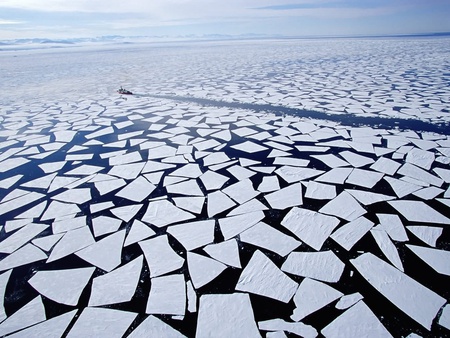| [URL=//nature.desktopnexus.com/wallpaper/297213/] [/URL] [/URL]
Journal 1. (2019)
After Larsen C ice sheet broke off, many are concerned if this is a new evidence of global warming and impending catastrophe for the world in our near future. What is happening to this least known of all continents on Earth? Is it falling apart, and should we be worried about it? Here is an article which may be of help to those concerned.
"Antarctica boasts a great many superlatives: it is the driest continent, the coldest, the remotest, the windiest and the highest on average. Right now, during midwinter, it is also the darkest. As a rift on the continent’s Larsen C ice shelf lengthens and gets closer to the ice front, we are anticipating the detachment of a large tabular iceberg within the next few weeks.
This comes after observations of a waterfall on another ice shelf last summer, reports of extensive surface melting on several ice shelves and, in a report last week, indications of a widespread surface-melting event, which included rainfall as far as 82� south, during the 2015-16 El Ni�o. Are glaciologists shocked by any of this? Is Antarctica going to melt away? Is Larsen C about to collapse?
The answer to these questions is no. Glaciologists are not alarmed about most of these processes; they are examples of Antarctica simply doing what we know Antarctica has done for thousands of years. But because there is a potential link between the ice sheet and climate change, glaciologists are suddenly faced with a situation where the spotlight is on our science on a seemingly daily basis, and every time a crack grows, or a melt stream forms, it becomes news. The situation is a conundrum: we want people to be aware of Antarctica and concerned about what might happen there in the near future as climate changes. But hyping research results to sound like climate change, when they are just improved understanding of natural behavior, is misleading.
To understand all of this, we need to think about how Antarctica works. The ice sheet stores 90% of Earth’s freshwater, which would translate to about 60m of sea-level rise around the globe if it all melted. If Larsen C were to disappear, its tributaries could contribute about 1cm to the global sea level.
[URL=//nature.desktopnexus.com/wallpaper/2351228/] [/URL] [/URL]
The ice gets there through snowfall, just like the ski slopes at Chamonix, but, in Antarctica, with annual average temperatures ranging from -5C to -60C, most of the snow that falls over winter remains at the end of each summer. Over millions of years, snowfall has been added, buried and compacted by new snowfall, and an ice sheet has grown."
In regard to rising sea levels, my understanding is as follows. Soft water is less dense so it stays above the heavier, salty oceanic water. As it gets to warmer regions of the Earth, it will evaporate into clouds. More clouds means more rain. Some of that rain will be absorbed by the soil and plant life that it falls on, and some of it will quickly evaporate back into the clouds again. We may end up with more torrential rains and faster weather patterns around the world and, less droughts. Slight rise in sea levels is a possibly but in all probability not as much as feared. More overcast skies above us mean, less heat to bother us. Clouds act as a blanket and cool down the temperatures significantly. Yes, it may get more steamy in some places but basically speaking, if earth loses all its snow and ice, the whole Earth will become less bothered by heat from the sun. What goes up must come down. More rain, more plant life that feeds on CO2, so the planet gets rid of feared gases. Also, by that logic, our planet may return to paradisaical conditions once again. No winters to worry about. Now, wouldn\'t that be something!
Larsen C Ice Sheet Breaks Off. What Next?
https://www.youtube.com/watch?v=jDXr98pt0bg
https://www.sciencenews.org/article/changing-climate-10-years-after-inconvenient-truth
Warm water discovered beneath Antarctica\'s \'doomsday\' glacier, scientists say
https://www.usatoday.com/story/news/nation/2020/01/31/thwaites-glacier-warm-water-disco...
|
| Recently Spotted MembersNo members found. Be the first. |





 [/URL]
[/URL] [/URL]
[/URL]
